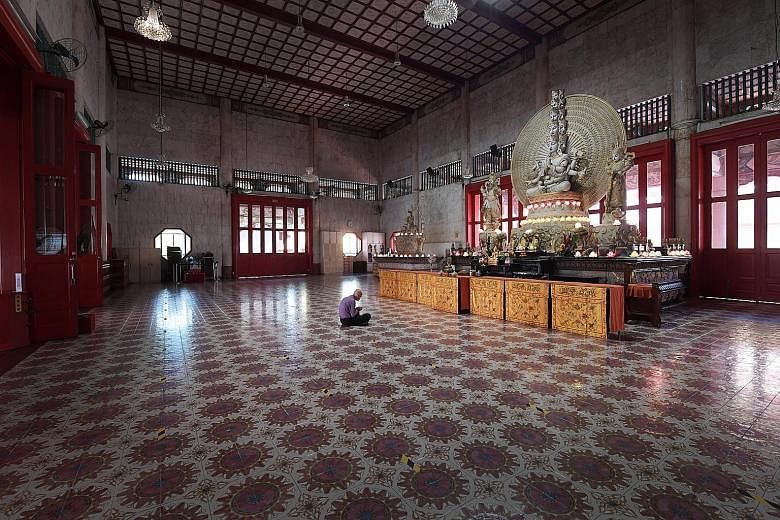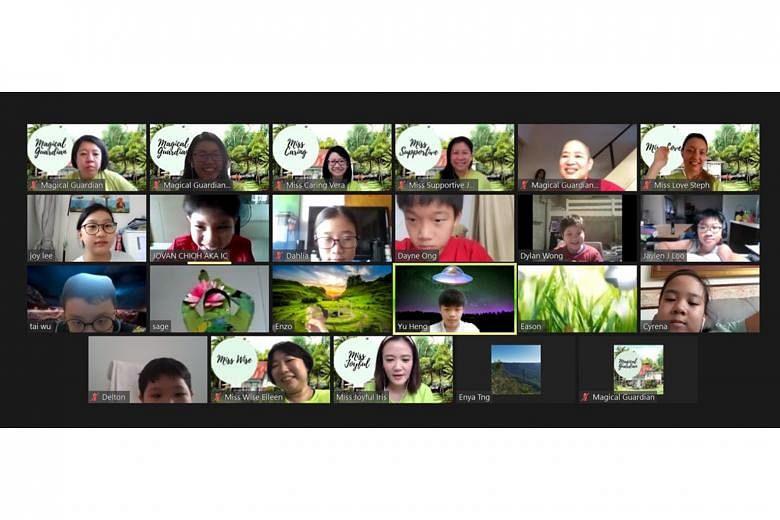When the Hungry Ghost Festival rolls around next month, you will not be able to catch the colourful sights and sounds of getai in your neighbourhood.
But you can enjoy the shows - held for the spirits that are said to roam the earthly realm during the seventh lunar month - online.
Lively auction dinners, another festival staple, will make way for silent auctions. The festival takes place this year from Aug 19 to Sept 16.
Mr Tan Thiam Lye, 70, honorary secretary of the Lorong Koo Chye Sheng Hong Temple Association, says it has had to adapt its practices to the Covid-19 pandemic.
The temple in Arumugam Road launched an online devotee management system on July 5, allowing worshippers to give donations, send blessing lights and purchase religious offerings remotely.
As for the Hungry Ghost Festival, Mr Tan, who is also chairman of the Taoist Federation, says in Mandarin: "We usually have festivities like buffets and getai for a few days, but those are not possible this year.
"Instead, the temple will hold a silent auction for eight auspicious items on Sept 2. Devotees can drop their bids in boxes."
Getai organiser Aaron Tan, says he has so far firmed up plans to stage 10 online getai gigs during the Hungry Ghost Festival. It is not the first time the 44-year-old director of Lex(S) Entertainment Productions is putting on virtual getai shows.
He started live-streaming his shows in 2016. His production company has also been staging getai shows in studios and putting the performances up online since March 30.
His shows garner 80,000 views on average on Facebook and YouTube.
At Kong Meng San Phor Kark See Monastery, Singapore's largest Buddhist temple, annual prayers for the seventh lunar month, also known as the Ullambana Festival, will be done behind closed doors this year, a spokesman says. Members of the public are not allowed to attend the session, which typically attracts thousands of devotees.
Since the temple in Sin Ming reopened for public worship on July 1, worshippers have had to book slots via an online system before visiting. The slots, in hourly blocks, are snapped up quickly.
There are plans for some classes for its devotees to be moved online as well, such as weekly meditation classes by its Venerable Chuan Hang, which will be held via video-conferencing platform Zoom from Tuesday.
Similarly, Buddhist temple Thekchen Choling (Singapore) in Lavender is doing its best to go contactless and online, says acting chief executive officer Emmeline Ang.
It held an online religious retreat over a weekend last month to chant a prayer 100,000 times and about 400 people signed up.
"We would usually attract only about 200 people if the retreat was held in Malaysia or at the Singapore Expo," Ms Ang says.
Dharma lessons for children and youth and meditation classes for adults are conducted over Zoom. There are also weekly dharma teachings and daily morning prayer sessions streamed online via Facebook Live. These efforts, she notes, are likely to continue after Covid-19.
Ms Ang says: "I think it helps us engage with followers here and overseas, since not everyone can make it to the temple each morning for prayers."
The temple is looking at physical changes as well, she adds. Due to limited space, only seven people are allowed into the main hall at one time, although up to 50 worshippers are allowed for religious service under pandemic measures.
A gantry entry and exit system has been implemented, and the drawing of divination sticks was stopped to minimise surface contact.
Ms Ang says: "Moving forward, we hope that the exchange of money can be contactless and we can maybe use PayWave, QR codes.
"We're also thinking of innovative ways to make services like the drawing of divination sticks electronic. Perhaps through a vending machine?"
But some devotees still prefer in-person worship.
Mr Low Hao Rong, 49, a primary school teacher who has been going to Thekchen Choling (Singapore) for about a decade, attended its online retreat last month and is part of a devotee-initiated prayer and chanting session that takes place every Saturday on Zoom.
"Technology is good for connecting and can do so with more people. However, I prefer physical interaction with other devotees to build stronger relationships, as well as praying and performing rituals in the temple. It gives me a sense of belonging."
Ms Michelle Trisno, 22, a digital marketer in the e-commerce industry who visits Buddhist temples like Mangala Vihara in Eunos and Wat Ananda Metyarama in Bukit Merah, believes that e-worship should continue after the pandemic.
The co-founder of memor.co - an Instagram and Facebook group which aims to raise awareness about Buddhism and its principles to youth - also helped to organise an e-Vesak Day countdown in May on Zoom and Facebook as part of the organising team of Buddhist Youth Network, a non-profit organisation. When about 3,000 people tuned in, she was pleasantly surprised.
"It's hard to get 3,000 people in one temple for actual Vesak festivities," she says. "It will be good for temples to do both physical and e-worship services because they can reach so many more people."




